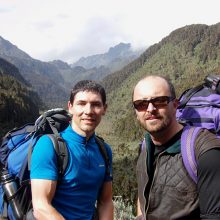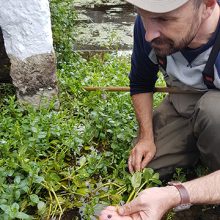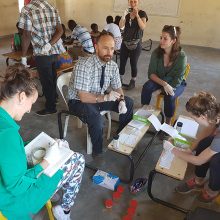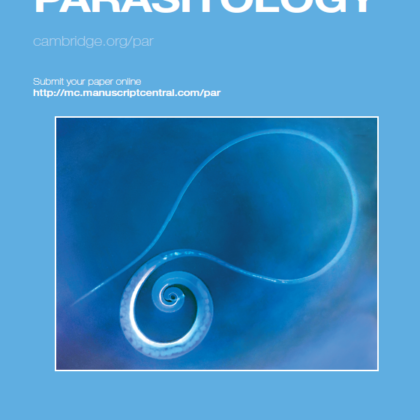Meet the Editors: Q&A with Professor J Russell Stothard, Editor for Parasitology
Welcome to our “Meet the Editors” series, where we interview the editorial team about their work and their relationship to the journal. In this post we meet Professor J Russell Stothard, Editor for Parasitology
What is your current job title both within Parasitology and outside of the journal? Where are you based in the world?

Since 2015, I am an editor of Parasitology and outside of the journal, a Professor of Medical Parasitology at the Liverpool School of Tropical Medicine. Although based in the UK, I work extensively in Africa/Asia for collaborative visits and fieldwork.
In a few sentences, please describe the focus of your work. Which parasites do you study? What is the goal of your research? What approaches do you use in your work?
My work is on parasites of medical and veterinary importance, with regards to their prevention and control. My focus is on helminths, with emphasis on the Schistosoma. As schistosomes also parasitize certain freshwater snails, I take a “OneHealth approach” where I seek to develop a detailed epidemiological knowledge of their aquatic and terrestrial biology. Moreover, as young children bear the bulk of these infections, I also pay attention to the interplay with malaria. As my research brings together field- and laboratory-based diagnostics, I hope to provide best evidence for later uptake into revised WHO policies and practices.
When did you first become interested in parasitology as a field? Did a particular teacher or mentor direct your career path?

As I grew up on a livestock farm in coastal Northumberland I was fascinated firsthand by parasites, for example, Ascaris in pigs and Anisakis in fish. I was fortunate to study Zoology and Microbiology at Leeds University and was taught parasitology (viz. agricultural zoology) by Professor Donald Lee. Donald, with several others, kindled my interests in helminthology of marine mammals; Dr John Grahame’s expertise in marine molluscs then pointed me towards medical and veterinary malacology. This led onto a PhD at the Natural History Museum under the supervision of Dr David Rollinson where I first undertook multidisciplinary studies on schistosomiasis in Africa.
How did you first become familiar with Parasitology?
As a postgraduate I often read the journal, especially special issue volumes on dedicated topics. For example, I still have a personal copy of 1993 Human nutrition and parasitic infection and, even today, I sometimes make reference to papers within it. As a postdoctoral researcher I was grateful to Professor Frank Cox, then editor, who took a kindly interest in developing and publishing my work on trypanosomes. Over the years, I have been guest editor of four special issues, working with Les Chappell then later John Ellis, who helped me better understand all the interlinked stages within the publication process.
What motivated you to become an editor at Parasitology?
Now being mid-career, with hopefully sufficient experience and a passion for appreciation of all aspects of parasitology, I felt it important not only to support the journal but also advance the discipline itself. It is important to promote the central foundation of parasitology within biology as simply put, all organisms are involved in parasitology in some way, either as parasites or as hosts, or perhaps even as academics!
What is the best part of editing for Parasitology?

It is a privilege to read some of the best scripts and learn of the latest results from the extensive network of authors that contribute to the journal. In developing their trust and research endeavors, I also hope to play a small part in improving their outreach to an international audience. The teamwork amongst the editorial board and production staff is also very convivial, and I feel that we continue to produce something that is greater than the sum of its parts.
Do you have any advice for those submitting to Parasitology?
Yes, first hone your idea and story to your personal satisfaction then ensure that your manuscript is equally compelling to a non-specialist/generalist reader. Take particular care to produce succinct tables and quality figures, orchestrating your manuscript such that the key themes/outputs are as clear as possible. The manuscript is a balance between your research endeavors and a conduit of learning for others, so take time to spell this out in the covering submission letter. Remember that suggesting one or two appropriate specialist referees is very helpful when we first triage manuscripts.
What advice would you give to early career researchers who are just starting out in parasitology as a field?
To be successful in parasitology, try to think like the parasite and imagine their strange worlds from within. This helps establish new lines of research to explore and then later follow-up with data collection/analysis. In terms of a future academic career, be mindful of its current challenges and future fashions, and that the enthusiasm you have for your chosen parasite has to stand a longer test of time. If it doesn’t come naturally, learn to enjoy scientific writing both through reading the work of others e.g. Stephen J Gould, and trying to find and develop your own best style. My final advice is to maintain an interest in parasites both as a keen amateur as well as an educated professional.






